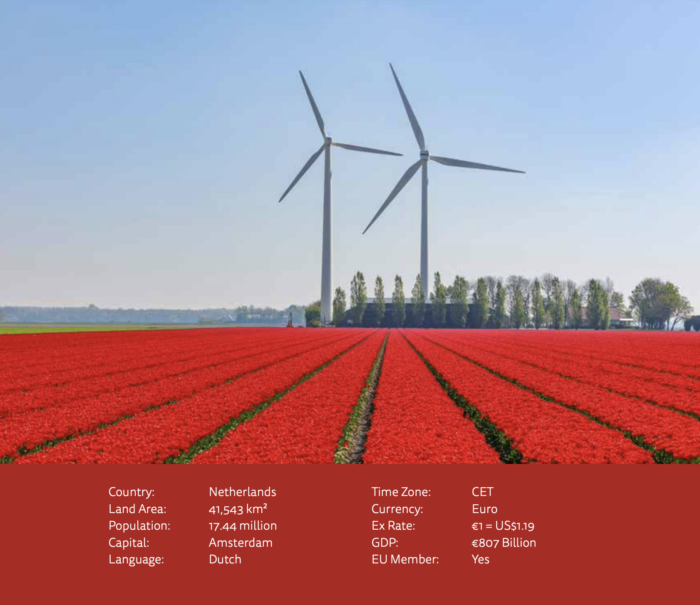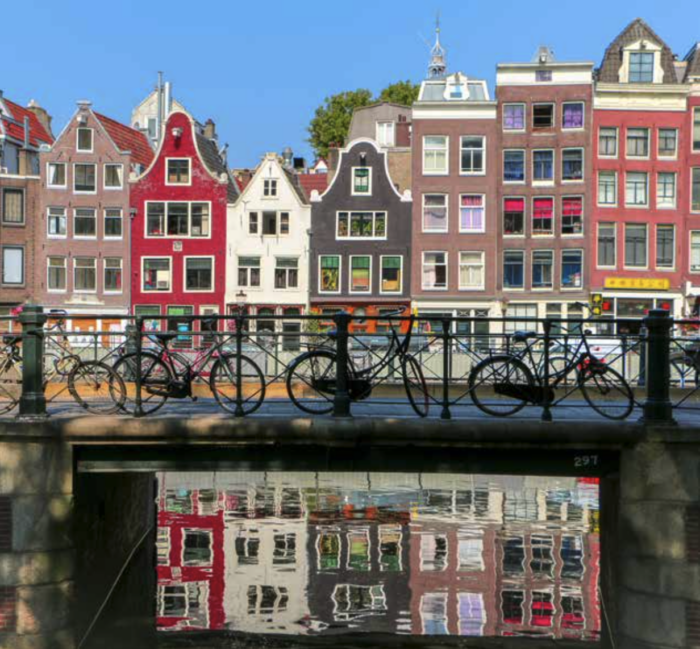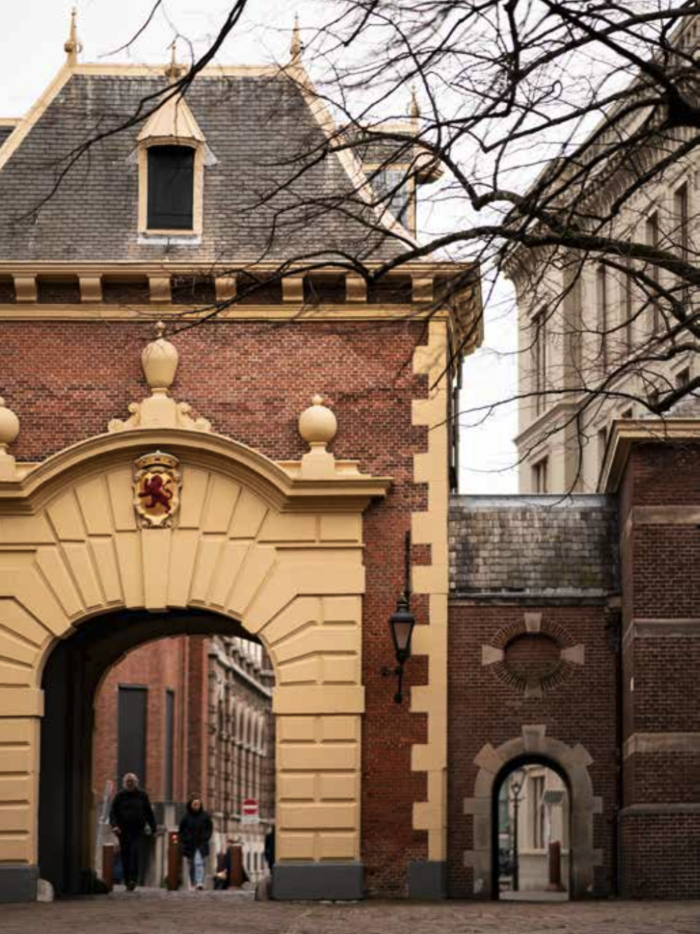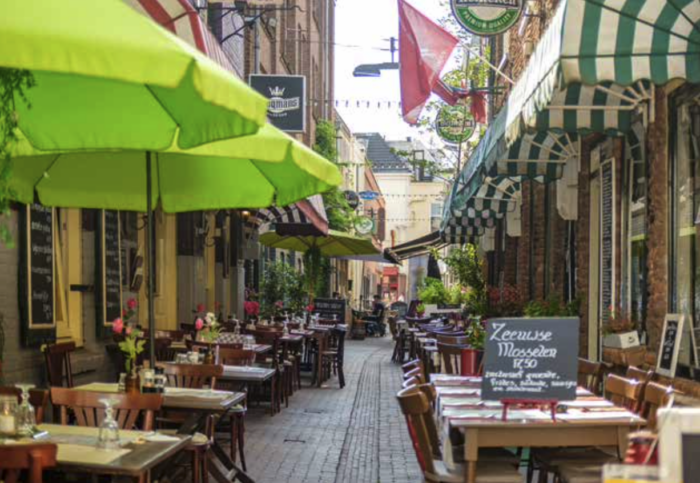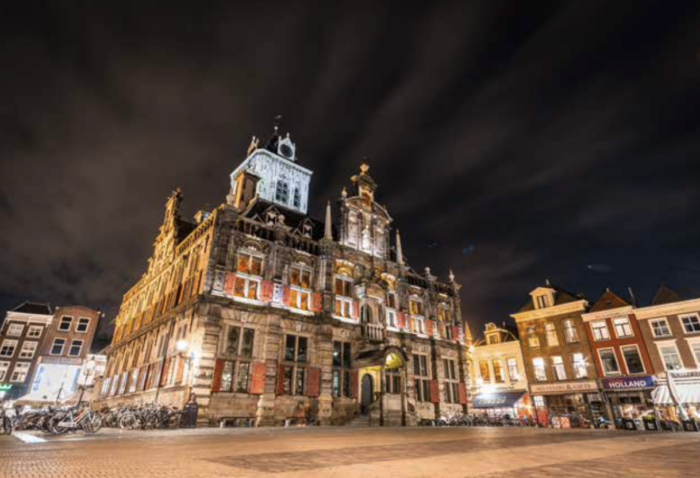The land we know as the Netherlands was originally inhabited by Germanic tribes. A portion of it became a Roman province in the first century BC and later, became part of the empire of the Franks, then the House of Burgundy, and eventually became part of the Habsburg Empire. In the 16th Century the land came under Spanish Rule and the Dutch rebelled. Their leader was Willem of Orange and in 1581, the Republic of the United Netherlands was formed.
During the 17th century, the Netherlands became an international power known for its strong navy. They also expanded their empire throughout the world at this time and had colonies on almost every continent. Dutch culture was also at its height with the rise of notable artists such as Rembrandt and Vermeer.
The Netherlands tried to stay neutral during both World Wars but were occupied by Germany in the second. Famous Jewish girl Anne Frank wrote of hiding from the Nazis in Amsterdam before being captured. After World War II, most of the Netherlands’ remaining colonies were granted independence. The country was also one of the founding members of NATO in 1949, is a member of the United Nations and was also among the founders of what has become the EU.
Principal Industries in the Netherlands
The main industries in the Netherlands are comprised of sectors such as agriculture, energy, manufacturing and tourism.
Other Important Industries
In addition, the Netherlands is also involved in fishing, banking, electrical engineering, and is very well-known for its creative and high-tech industries.
Doing Business in the Netherlands
The Netherlands is one of the most open economies in the world and among the best countries for technology and innovation. It offers an outstanding infrastructure, including Europe’s largest port, a competitive business climate and its membership of the EU puts 450 million customers on its doorstep.
With industry sectors covering agriculture, energy and manufacturing the Netherlands is in an excellent position to benefit from the latest innovations in agri-tech, energy technology and manufacturing automation. That’s why there’s no shortage of tech start-ups in the Netherlands and even more scale-ups attempting to enter the Dutch market. In fact, The Dutch tax system actually encourages entrepreneurship and there are several tax incentives to stimulate innovation and business activities.
What’s more, with the Netherlands being home to several top-class universities, there is a rich pool of talent to choose from every year. Also, with the Netherlands being such an attractive place to live, there are plenty of foreign workers as well.
The View from the Ground Part 1
When describing a country and its culture, you can write down all the facts and figures you like but if you want the full story, you need to get the perspective of someone with a lived experience of being there. That’s why we’ve asked Daan to give us his take on what it’s like to live and work in the Netherlands.
What’s important in a Dutch business meeting is equality between both parties. We don’t like the idea of a little vendor having to bow and scrape to a big customer. That won’t work for us. There has to be mutual respect, and everyone has to treat everyone else as if they are on the same level. Also, avoid an indirect communication style as this really offends the Dutch. You probably think you’re being nice and trying not to hurt our feelings, but what you’re really doing is wasting time. The Dutch, as you probably already know, have a very direct style of communication and we are actually proud of this. It means that everyone knows where they stand immediately, there’s no room for confusion and the crux of the matter has been dealt with quickly. It’s a very efficient system. The reason for the meeting is to find out if there is a fit and if there’s not then so be it. It would also be appreciated though if the customers would recognise there is no fit and communicate that. In Belgium for example, they keep on talking and giving you the impression that something could still happen when what they really mean is, “no” but they don’t say it.
If you look at the numbers, the Dutch do a lot of trade with Germany, but I would say that Germany is difficult to enter. In fact, I’ve had more trouble entering Germany, even though it’s attached to the Netherlands, than with Scandinavian countries for instance. There seems to be much more of a hierarchy in Germany and that can mean it’s difficult to get hold of the person you want to talk to. There are of course exceptions to the rule but overall, I’d say we like to do business with the Germans but they’re not necessarily a cultural fit for the Dutch. We trust the Germans very much because we know that if you do business with them, they won’t mess you around, so that’s a fit with the Dutch philosophy of what you see is what you get. But, the Germans are very difficult to start doing business with and France is even worse. France is the most difficult country in the world to do business with if you’re not French yourself. I think this also applies to French speaking Canada. Actually, everywhere they speak French, it’s difficult to do business if you’re not a local. From a company point of view, we get on very well with the Israelis. Culturally, we’re on different planets but business wise we get on well. The trick is, you have to know a little bit about the Israelis first before you can do business. If an Israeli customer tells you to jump and you ask, “how high?” you will lose their respect immediately. If the Israeli customer tells you to jump and you say “no, because of x, y and z”, then you earn their respect. The Dutch and the Israelis share the trait of directness, and the Israelis can sometimes take it to another level. While the Dutch try to be direct in a non-offensive way, the Israelis can be so direct that it is actually perceived as offensive. They don’t really mean it that way, it is just their manner. And, as long as you understand that they are just being over direct rather than trying to offend you, then it’s fine.
Having a business network in the Netherlands can help but at the end of the day, it’s the business that’s important. For example, if I have a friend with a product that I might be able to use and there’s another guy with a different product that’s a better fit for what I need, then I’m going with the second guy. The first guy will still be my friend, we’ll still keep drinking beers and having fun and he’s still in my network but I’m picking the product which is best for me even if it’s from someone I don’t know.
In the Netherlands, we don’t really go out for business dinners or lunches. Certainly not in comparison to other countries. For us it’s very much a case of let’s get the business over with and then we can talk about dinner. I know in some cultures it’s all about wining and dining but not here. Well, maybe as a way to celebrate a good deal but not somewhere to conduct a deal.
You certainly wouldn’t want a fancy dinner to be perceived as an attempt to influence a business decision. It’s the same with gift giving. It’s not exactly frowned upon but it’s certainly not common in the Netherlands. I mean you send a bottle of wine at Christmas and that’s okay but that’s it. A lot of companies in the Netherlands, and particularly government departments have a cap on the value of goods you may receive as a gift. I think it’s up to €50 or something like that and if it’s above that, you can’t accept it.
I like to keep a certain distance between my work and my private life, although I do have a lot of friends from a former job. I don’t go to my colleagues’ birthday parties or stuff like that but if they get married, sure I’ll go of course but I don’t turn up for barbecues. I know there are people in the company who are quite close and like to do things also at the weekend, but that’s just not me. Sure, I can do a few beers on a Friday afternoon and that’s fine but then I go home.
I think humour in the office is very important. I have to laugh every day or else I’ll go crazy. You need to have fun and laugh and not take yourself too seriously. We like to have fun at the office. Sometimes if I make cold calls for instance or semi cold calls, I often see colleagues with that look on their face that says, “How the hell was he able to say that and still get good feedback?”
There are some things that foreigners find funny about things we do, like the way we’ll precisely split a bill and negotiate for the last cent. Also, we are well known for starting and ending meetings exactly on time. Culturally, we’re quite conservative in that we don’t particularly like to show off. We definitely don’t like to show off wealth. I might drive a nice car, but I wouldn’t tell you about it and it’s culturally unlikely that you would ever ask me about it. It’s like we’re embarrassed by success. In relation to that, one thing that always strikes me is if you go abroad for instance, even to Germany, Switzerland, France or especially America, you see lots of national flags. Have you ever seen a Dutch flag somewhere outside of King’s Day? We are not nationalistic. We do not stand up and say that we are proud to be Dutch. But then, we get behind our football team like no one else. Then we’re all happy to be Dutch and proud to be orange and all that stuff, but the next day we go back to normal. If there’s not an event or anything like that and you ask someone, are you proud to be Dutch, people will respond with things like, “well yeah, we’re doing OK and we have nice things”, but if you ask the same thing to an American, they will say that America is best country in the world. We need to do more of that.
The View from the Ground Part 2
The Netherlands is Aexus’ home territory and such an important market that we wanted to add the perspective of Luna on what it’s like to live and work in the Netherlands.
You’d better not be late for a Dutch business meeting. They really don’t like it, especially if it’s more than once. You know, it doesn’t matter if you’re like 5 minutes late and if that happens once, it’s fine but when the Dutch have to wait for half an hour for you to join the meeting, that’s too much. Then they’ll get annoyed and say this is not acceptable at all and will start wondering if you’re even serious about doing business. Obviously, if you call in advance to say there’s been unexpected roadworks or something, that’s fine but simply not showing up when you’re supposed to is the worst thing.
Also, try not to have too indirect a communication style. I mean, we understand people are indirect because of their cultural background, but Dutch people prefer to do business in a very direct way. We’re happy to say that we like something, or we don’t like something, and we actually appreciate it when people do that back to us. Of course, you have to consider other people’s sensibilities, but I’ve developed a knack for reading people who are being indirect. It’s a combination of body language and listening closely to the way they compose their message. Sometimes, when they have very positive news, they directly share it with you in a very enthusiastic way but then when there’s something negative to say, yeah, they try to twist around the subject, shuffle their feet, avoid making eye contact and fidget when they speak. If it’s negative, it’s negative but just share it, it’s fine. At least that way I can move on rather than spend more time on something when there’s not even going to be a deal at the end of it. I think some people are indirect because they think we’ll take offence. Really, we don’t. We don’t think it’s rude and we won’t judge you for it, but there’s business to be done and time is money.
The Dutch don’t really have a hierarchal system in place at all. I know places like Germany and Austria have a very strict hierarchy but that doesn’t happen here. In fact, a strict hierarchy can often make it difficult to get hold of the person in a company that you actually need to speak to. Here, we tend to believe that everyone is equal to everyone else. Everyone talks to each other. I can send the company founder and owner an email and know that I’ll get a reply within let’s say an hour and I don’t have to pass through some gatekeepers from other departments. And, I think that’s certainly the way it works for SMEs in the Netherlands. There might be some older institutions which are more traditional in their approach. It’s also kind of a cultural thing because as a people, we try to be as open as possible. One thing is certainly true though, even in countries where there is a strict hierarchy, the tech companies and the start-ups are all much more relaxed and have very flat structures. A reason for that may be that the founders of the start-ups are more likely to be tech people rather than traditional business types, so they don’t have any desire for a strict hierarchy. They are calm, relaxed and open-minded people who care more about the product they’re working on or the problem they’re solving more than anything else.
The start-up scene in the Netherlands is going amazingly well at the moment. I heard recently that the number of start-ups has doubled in the last year. I know there are government incentives and funding for start-ups, but I think the other side of the coin might be that the constantly evolving nature of tech means that there are simply more new ideas coming online all the time. The investment in the tech industry, regardless of whether it’s government or otherwise is good for us though. It allows us to stay in the game and gives us a competitive advantage on the international stage. Amsterdam is without doubt the biggest tech hub in the country with Eindhoven trying to catch up but they’re still a very long way behind. The universities have been playing their part as well by producing a wealth of highly qualified graduates every year. There are some world-class universities in the Netherlands and they are producing some top people.
When it comes to scaling, I think every tech start-up has the dream of ending up in Silicon Valley or San Francisco in the Bay Area. I think that’s the kind of dream all those companies have but it’s also a plan for the longer term. At first, they would look at cities that are closer to home such as London and also Berlin, which I hear is a really good city for tech. Basically, we can scale to wherever there is a need but some markets are easier to penetrate than others.
Despite the number of start-ups and scaleups already here, there’s still plenty of room for tech companies to scale into the Dutch market. The Dutch are very open to new tech and they don’t shy away from foreign products. And, even though we’re a small country, there’s a huge appetite for innovative tech, especially if it comes from the West although there are some countries that are more difficult to work with. For example, I think China is a really complicated country to try and scale into because you have to deal with a lot of regulations. Also, they’re trying to protect their own companies which makes it very difficult to conquer the market. Spain and Italy are also hard because everything happens really slowly. It’s like they operate at a totally different pace. The most annoying part about it is that they don’t feel the need to reply in time and with particular regard to the Spanish, they can sometimes be indirect in their communication, which makes things take even longer.
If it’s somebody’s birthday in the office, we’ll have a small celebration there with a cake or something. But after work, when everyone goes into the city centre it can get kind of wild. Covid has had an impact on how often we go out after work because we’re not all working from the office. Previously though, we might go out one or two nights a week. We’ve got some team days coming up though which should be good. I know we’ve got a dinner together in Amsterdam soon and we’re going to go out and party afterwards, and some of my colleagues are teambuilding in Spain right now. I’ll be on the next trip for sure. This might all sound a bit flashy which feels strange for someone from the Netherlands. As a culture, it’s not in our nature to be flamboyant or to show off. In fact, there’s a Dutch phrase that says, “If you act normal, that’s crazy enough.” People have strong opinions about it and could even end up talking about you behind your back. For instance, if a neighbour has a super expensive car, people will be questioning why he is doing this, why is he showing off like that. I think my generation will show off a bit more than my parents would have done and that probably has something to do with social media. Generally though, the Dutch don’t like to make a big thing about their wealth or status.
Although, there are two things on the Dutch calendar that make us go a bit over the top and that’s King’s Day and whenever the national football team is playing. Then we’ll all dress up and wave our flags. These are the only outpourings of nationalism though because as soon as it’s the 28th of April or the final whistle has blown in the football, everything goes back to normal. We’re certainly not pledging allegiance to the flag or singing the national anthem at school every day.
We also like to celebrate Christmas, Easter and New Year. Christmas and Easter are mostly a time for family as we’re not a massively religious country. Actually, the towns Under the Rivers are a bit more religious but as for the rest of the country, not really. New Year on the other hand is just a huge party. It’s big and it’s loud. Because we’re so close to the German border, people will go across and buy super cheap fireworks like a week before, even two weeks before. Then, on New Year’s Eve, the fireworks are a big thing. There’s also a lot of parties as well and yeah, there are a lot of things going on.
As for fun in the office, we tend to laugh at each other really. We don’t tell jokes like a stand up, but we will tease each other mercilessly like if someone messes up on a call or says the wrong thing. Yeah, they will be reminded of that for weeks. Okay, so what happened to me was that we all had to prepare a pitch and then present it to the group. Well, I don’t know how or why this happens but when I’m presenting out loud something happens to my voice which makes me sound like a television commercial voiceover. So, I got teased about that for a while.
Business Etiquette
Dutch people use an informal yet direct manner of communication in their business culture, although a few strict formalities are present. For instance, when there is a notable difference in age or in rank, people will use the formal “u” and “meneer” (sir) and “mevrouw” (madam). The typical Dutch communication style among colleagues is the informal “je” and first names. Strict punctuality is expected but formal business attire is not. How informal of course will depend on your domain but smart casual should cover most business situations.
In a Dutch meeting, you will typically shake hands with everyone present and remember to make eye contact during conversations as this is seen as a sign of trustworthiness. The negotiations will most likely proceed at a rapid pace. The Dutch are forceful and tough negotiators but good businesspeople and know a deal when they see one. Lastly, a piece of advice, remember that honesty and reliability are vitally important in the Dutch business culture.

